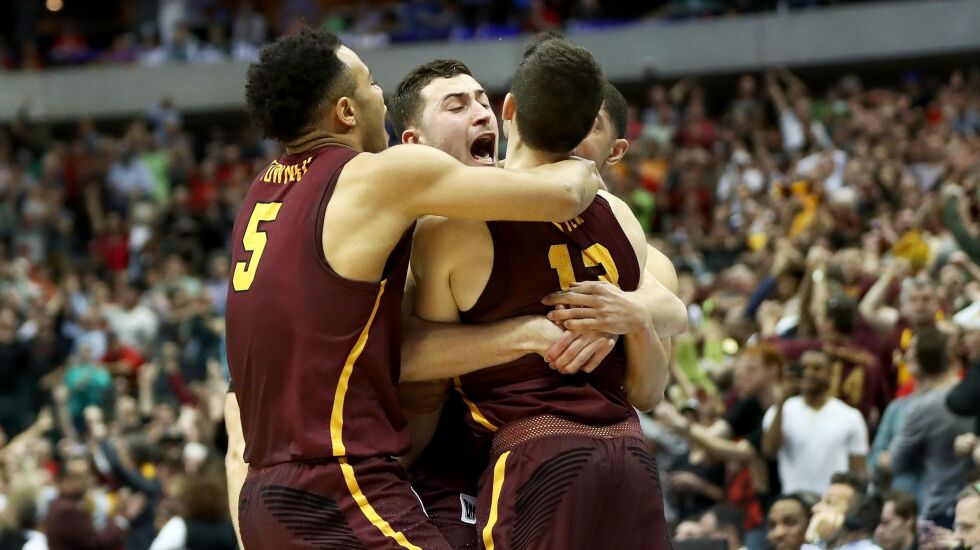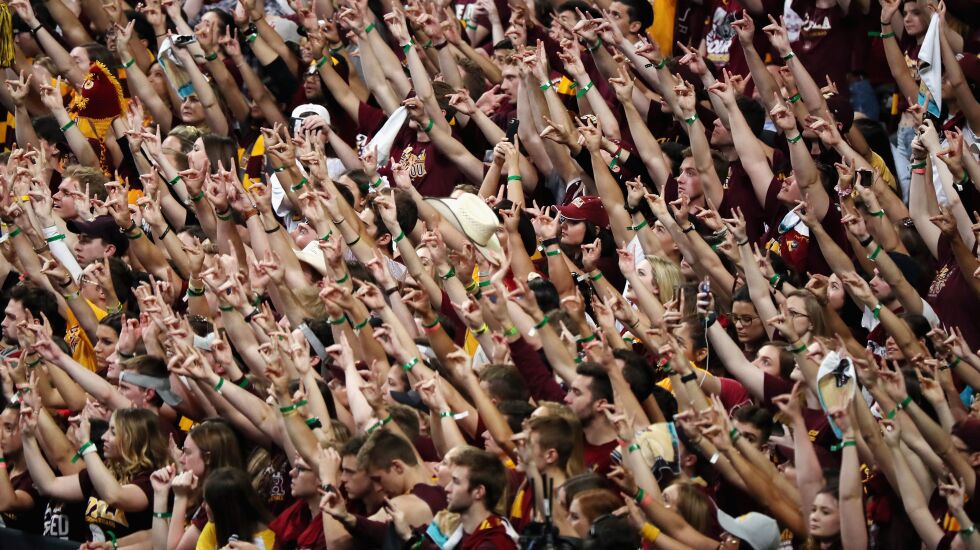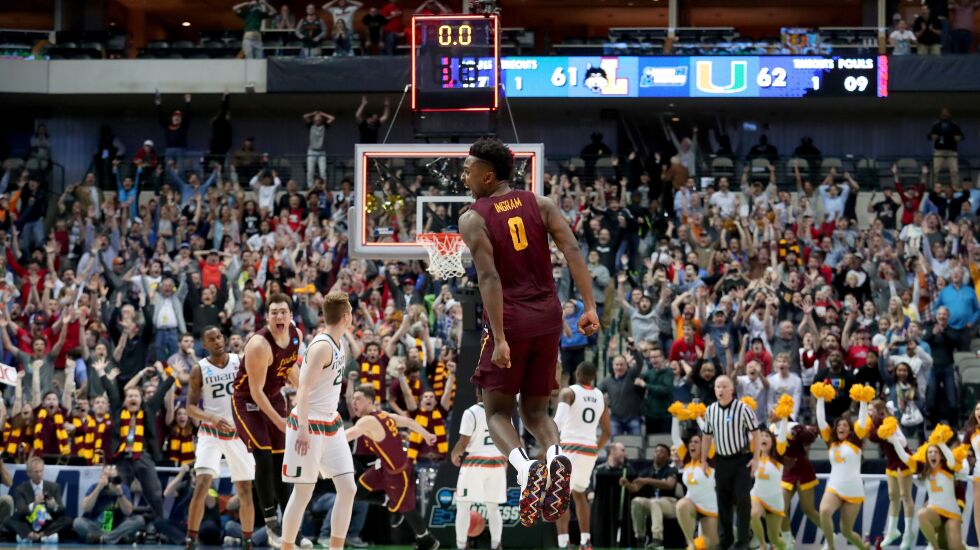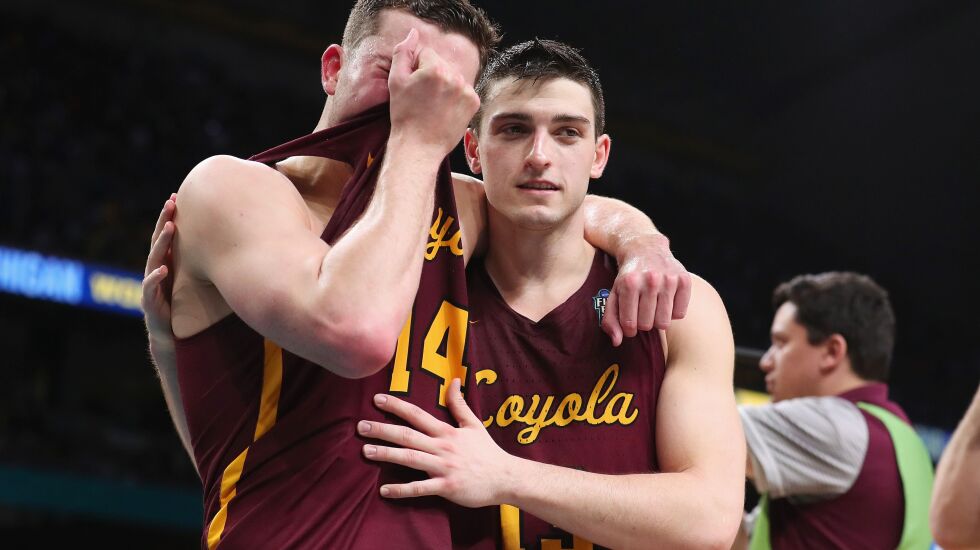
None of it would have happened if Ben Richardson hadn’t “started the dominoes,” to use a favorite phrase of former Loyola men’s basketball coach Porter Moser.
No first-round magic in Round 1 of the NCAA Tournament against Miami. No maroon-and-gold explosion that made traveling Ramblers fans look to the rest of the world like an army of Harry Potters. No household name for America’s nun. No Final Four.
And certainly no reason for us to revisit, five years later, the wildest college basketball run Chicago has seen.
“It was madness,” says Moser, now running the show at Oklahoma.
Back to Richardson. The Ramblers were down a point to Miami in the closing seconds when a Hurricanes free throw bounced on the rim not once, not twice but an agonizing five times. Loyola’s Donte Ingram eventually got a few fingers on the ball, as did Miami’s Sam Waarderburg, but both mistimed their jumps and together they redirected the ball toward a corner of the floor. Waarderburg — an 87.5% foul shooter — had a bead on it, and if he got there first, it probably would have been game over.
Richardson had already taken multiple steps toward Loyola’s basket, but — suddenly, intuitively — he pivoted and made a beeline for where he thought the ball would end up. He got there in the nick of time and threw the ball ahead to the next domino, Marques Townes, who found Ingram for a game-winner fit for a time capsule.
“And the rest was history,” says Richardson, who’s in his first year as a business development specialist for an insurance-services company in his hometown of Overland Park, Kansas, after playing professionally for four teams in four European countries.

Miami, Tennessee, Nevada and Kansas State all went down as Loyola capped a season-long celebration of its 100th season of basketball with a thrill ride through Dallas, Atlanta and San Antonio. The 11th-seeded Ramblers tied three other teams — LSU (1986), George Mason (2006) and VCU (2011) — as the lowest seed to reach a Final Four. UCLA joined the club in 2021.
There were so many plays, so many moments, so many feelings along the way that have stayed with members of the team. To Richardson, nothing topped the returns to campus after the second round and the South Region final.
“We could truly feel the energy and excitement around the university and the city,” he says. “Seeing the skyline lit up with maroon and gold was surreal, and we felt like we were sharing the celebration with all of Chicago. It was a huge honor.”
Drew Valentine, Moser’s successor, was an assistant coach in 2018. Laughing, he recounts an exchange the coaches had during a timeout before the Ramblers’ next-to-last possession against Miami. They were convinced Ingram would shoot no matter what if he touched the ball, so what did they do? They drew up a play for someone else, in this case Townes. Despite an empty trip, Ingram ended up bailing them out anyway — deliciously ironic.
In the second round, Clayton Custer, the most decorated player on an extraordinarily balanced team, matched the excitement of Ingram’s moment with a hanging 16-footer to upset Southeastern Conference co-champion Tennessee.
“Imagine yourself in your driveway, working your whole life for a moment like that,” says Custer, who works for Moser as Oklahoma’s director of video operations and player development and fully intends to become a head coach. “I was able to actually have that dream come true.”
But he recalls more vividly the hugs and elation shared by everyone after the Final Four-clinching win against Kansas State — “the best memory of all, easy,” he says.
And he still can feel the pain of walking off the floor and up an Alamodome tunnel with Richardson — his boyhood best friend from Overland Park — after it all ended against Michigan in San Antonio. Richardson cried the whole way, leaning on Custer, who held him tight.
“Now that I’ve been in coaching for a few years, I think I realize how ridiculous what we did was, how hard it is to do, how unheard-of it is,” Custer says. “There are so many good coaches, so many good players. The resources at some of these [bigger] schools are just absurd.”
Four members of the team still are playing professionally, three of them overseas. Ingram is in Romania, Townes in Hungary and Cameron Krutwig in Japan, where he recently faced off in back-to-back games with former Illinois All-American Kofi Cockburn. Krutwig repeatedly proved himself to be more than met the eye in the post as a freshman in the madness of that March.
“The biggest thing for me now is the pride I feel for being able to help put Loyola on the map in the college basketball world,” he writes via direct message. “We really elevated the program and took the whole university to the next level. In the five years after the Final Four, we’ve been able to move conferences [from the Missouri Valley to the Atlantic 10], upgrade facilities (not just for basketball, either), increase admissions to the school, etc.”
Lucas Williamson also is playing, though not lately; he tore a ligament in a foot a couple of months ago while with the Clippers’ G League squad and was shut down for the season. He intends to continue his career, though he doesn’t know for whom.
Williamson calls the 2018 run “a blur, a dream.” Like Krutwig, he was merely a freshman.
“My favorite memory was in San Antonio,” he says. “Getting off the plane, they had a band and a red carpet. Our bus was decked out and decorated in Loyola Final Four stuff. There was a convertible car with Loyola signs on it that we could take pictures in. Riding [the bus] through San Antonio, the whole city was decked out. We pulled up to the hotel and it was completely decorated in Loyola stuff. There were pictures of players all around. There was a huge picture of myself in the hotel lobby.
“Also, the first time we walked into the Alamodome for practice, I just remember seeing seats as far as the eye could see. Just the pure scale of it was kind of insane.”
Asked for his favorite memory, Moser — a storyteller to his core — rambles on with anecdotes that could fill at least a few chapters of a mighty fine book.
The first one was after the conference tournament in St. Louis, watching Custer and Richardson with their arms around each other as they walked down a hallway to the press conference.
“They were almost, like, giving each other noogies,” Moser says, “and they just kept looking at each other and saying, ‘We’re going to the NCAA Tournament!’ ”
Another took place in a hotel ballroom where the Ramblers ate together — just them — after beating Miami. Moser sat back and watched his players poring over replays on their phones.
“They were like little kids,” he says. “I just remember sitting there thinking, ‘How cool is this? How special is this?’ ”
At Philips Arena in Atlanta, the Kansas State win in the books, Ramblers players ran to the section where their families were situated and saluted their parents. Then they climbed onto a podium at center court and took a confetti bath.
“It was pure joy,” Moser says.
Loyola won it all in 1963, but that team was considered a powerhouse going into the tournament. Fifty-five years later, what the Ramblers did truly was impossible to see coming.
May they never live it down.
A RUN TO REMEMBER
March 4: Loyola 65, Illinois State 49, St. Louis
Even at 27-5 and with a Missouri Valley Conference regular-season championship under their belts, the Ramblers had no illusions of a happy Selection Sunday if they fell short of the league tournament title. With one more game to win, they blitzed the Redbirds with a 9-2 start and never were seriously threatened. “We know we can beat anybody,” Ingram said after scoring 18 points and being named tournament MVP. “We knew that from Day 1.”

March 15: Loyola 64, Miami 62, Dallas
Seeded 11th in the South Region, the Ramblers trailed the sixth-seeded Hurricanes by a point and sent Lonnie Walker IV to the line for a one-and-one with 9 seconds left. Walker missed the front end, Richardson corralled a loose rebound and got the ball to Townes, who raced upcourt and passed to a trailing Ingram. From a full step beyond the top of the circle, Ingram let fly — swish! — giving Loyola its only lead of the second half and, though 0.3 second remained, let’s just call it a walk-off.
March 17: Loyola 63, Tennessee 62, Dallas
The third-seeded Vols took their first lead of the second half on a three-point play by star Grant Williams with 20 seconds to go. With 10.5 left, Custer took an inbound pass in the backcourt with Jordan Bone on him, dribbled three times to his left, then twice to his right and pulled up from the right elbow. The ball hit the rim, then high on the backboard, and fell in. Bone missed an off-balance three at the buzzer, the Ramblers had a school-record 30th win, and Custer threw the ball so high in celebration that it smacked off the American Airlines Center scoreboard. “The adrenaline going through my body was insane,” Custer says now.
March 22: Loyola 69, Nevada 68, Atlanta
The Ramblers were in trouble midway through the first half, down 20-8 to the seventh-seeded Wolf Pack, but they responded with a scintillating 20-4 run into the break. Ahead by a point late, Custer drove, drew a double team and kicked it to Townes in the right corner. Shedding a closeout with a pump-fake and sidestep to his left, Townes iced it with a massive three with 6.3 second left. “I’ll probably remember it for the rest of my life,” he said when it was over.
March 24: Loyola 78, Kansas State 62, Dallas
Coach Bruce Weber and the ninth-seeded Wildcats couldn’t handle what came their way. Richardson scored a career-high 23 and had the play of the game, a four-point play early in the second half. By the time the lead ballooned to 23, everybody in maroon and gold was rejoicing. The Final Four-bound Ramblers’ 14-game winning streak led the land, and Moser could only keep repeating the same four words as he saluted the team’s fans: “Are you kidding me!?”

March 31: Michigan 69, Loyola 57, San Antonio
Krutwig scored 17 — a sign of things to come for him — but it was a seven-point burst by Custer that put the Ramblers up 41-31 with 14:08 to go at the Alamodome. Was this really happening? Could it be? Alas, no. The Wolverines, the 3 seed from the West, turned to Moe Wagner, and he delivered on a 24-point, 15-rebound night. Did it save the Ramblers from a beating at the hands of eventual champion Villanova? We’ll never know.
A FIVE-YEAR PLAN
What will Loyola basketball look like five years from now?
The question is put to coach Valentine, whose second season — the Ramblers’ first in the Atlantic 10 — was a stark departure from the recent success in Rogers Park.
“When you even look at it now, coming off the last five years — three NCAAs, an NIT — our program still has a lot of juice,” he says. “When we get on the phone with recruits, they still know this program as an NCAA Tournament staple. …
“I think it [will be] a program of consistency and a program with a winning trajectory. I don’t know what that looks like, if it’s the NCAA Tournament every year or another Final Four, but an upward trajectory.”

The Ramblers have nowhere to go but up after finishing 10-21 overall and in 15th place — dead last — in the A-10 at 4-14. They ranked 13th in the league in both points scored and points allowed, 15th in field-goal-percentage defense and 15th in turnover margin. There was nothing flukish about where an often overmatched team finished after stepping up a bit in class from the Missouri Valley.
Custer, who was MVC player of the year the season the Ramblers reached the Final Four, spent the 2020-21 campaign as director of player development before following Moser to Oklahoma. Custer says the jump from the MVC to the A-10 is “significant.”
“Saint Louis, VCU, Dayton — these are high-major bodies,” he says. “The level of player in that league is a higher-level athlete.”
There’s some real catching up to do after a season whose high point came in the very first game. Against Fairleigh Dickinson at Gentile Arena, the Ramblers trailed by two with 1.8 seconds to play when Tom Welch heaved an 80-foot inbound pass to Sheldon Edwards, who stuck a turnaround jumper to force overtime. The Ramblers won 88-82, a night FDU’s Sean Moore remembered in an on-court TV interview after the Knights shocked No. 1 seed Purdue in the opening round of the Big Dance.
“Ever since that game,” Moore said, “I knew we could [get] where we are right now.”
Valentine appreciated the shout-out.
“That’s how our program was looked at,” he says.
Keeping it that way is the key.







